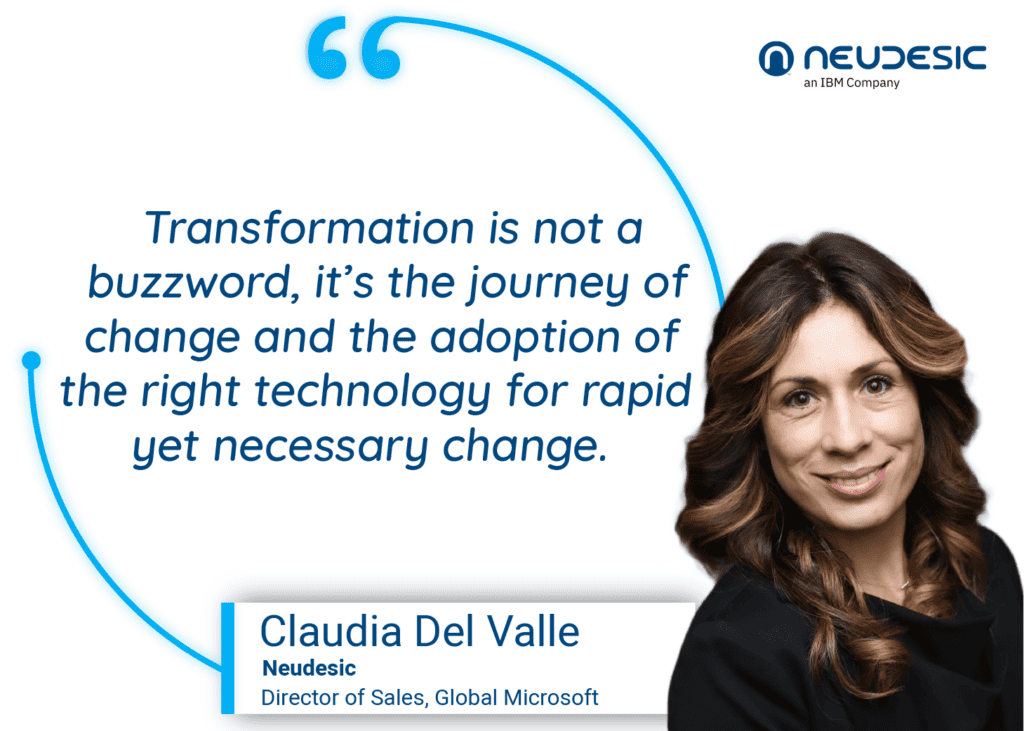Navigating the Age of Transformational AI with Claudia Del Valle at Neudesic
Neudesic is thrilled to announce the hiring of Claudia Del Valle, a seasoned technology leader with over 15 years of experience specializing in technology, digital transformation, and strategic alignment with Microsoft. Claudia brings a unique perspective to the organization, focused on harnessing the transformational power of AI and data in the financial services sector, insurance, and beyond.
We sat down with Claudia to learn more about her work and how she thinks AI will transform these industries. The following conversation has been edited for length and clarity.
Businesses Need to “Know Themselves” Before Meaningfully Adopting AI
Before a company can effectively implement AI technologies, it has to first understand its technological depth, then identify opportunities where AI can play a role in cost savings and acceleration. The goal is to deliver better solutions for customers — this requires a personalized approach where the alignment with partners who have mastered and executed these solutions can serve to accelerate and ensure stability using mastered frameworks and methodologies for industry best practices. This can include establishing a Cloud Center of Excellence (CCoE) to implement and govern transformation guardrails, as well as guidelines to put customers on a path toward success and digital maturity.
The pandemic has been a catalyst for significant change, accelerating digital maturity in the financial services industry. But growth will come from strategically molding technology into the business and strategy, not just from adopting the latest trends.
AI Knowledge Governance: Extracting Insights from Legacy Systems and Business Context
We’ve seen it before when buzzwords become the new normal. In the 1990s, it was “e-commerce.” In the early 2000s, it was “the cloud.” Nowadays AI is changing from a buzzword into a business imperative to remain competitive. Software like Microsoft Fabric can extract and harness essential data that would otherwise be hidden or lost within legacy systems in the financial services or insurance industries.
To make an analogy here, you might have many thousands of pictures saved on your smartphone. When it comes time to find that one beautiful picture you took of a waterfall, it’s as good as lost. But when your photo library can support an AI-enabled text search of the word “waterfall,” you’ll find it instantly.
Accessing and using this structured and unstructured data, however, is only a piece of the puzzle. Implementing AI to swiftly design, develop, test, and launch new solutions demands a clear business context and goals. These elements are often missing in current data governance programs. For instance, product managers equipped with AI, coupled with solid development practices, risk guidelines, and design standards, can develop and launch products much more quickly than their peers.
We call this holistic approach that captures the business’s strategy and context “knowledge governance.” It encompasses the policies, processes, and tools to manage the information lifecycle, ensuring that knowledge is accurately captured, maintained, and leveraged across all levels of the organization for operational efficiency and competitive edge. By syncing AI with our business objectives, context, and policies, we ensure that AI can be used effectively and efficiently to build new products or services at an organization.
Future Predictions: The Evolution of Data and AI in Financial Services
I predict significant transformations driven by data and AI over the next two to five years. The increased availability of data will lead to more informed decision-making in financial services. Traditional financial institutions are likely to evolve into fintechs, not only focused on privacy and security, but an enhanced customer experience as well.
I think we will also witness a greater emphasis on leveraging AI to improve the personalization and accuracy of FSI and insurance services. This could take the shape of enhanced predictive analytics for investment strategies, personalized insurance coverage based on individual risk profiles, or more intuitive customer service interfaces. This could enhance the customer experience, streamline operations, and potentially open new revenue streams.
Responsible AI: A strategic competitive advantage in Financial Services
In the rapidly advancing AI landscape within financial services, concerns about algorithm biases, legal issues with data sources, and regulatory debates are expected to be significant through 2024. However, AI's potential for societal benefits, like improved financial literacy, transparency, and inclusion, along with financial gains for early adopters, is substantial.
The key challenge is how to navigate AI's possibilities amidst legal and regulatory uncertainties. The answer is responsible AI. This isn’t just a theoretical concept; it's a practical framework for ethical operation, risk management, and AI integration in business. It ensures adherence to current and future regulations, maintaining corporate reputation and business continuity. A strong responsible AI strategy accelerates AI adoption and offers a competitive edge, equipping organizations to handle future uncertainties effectively.
Closing Thoughts
We’re at a pivotal moment in the evolution of financial services and insurance. These industries are undergoing a profound transformation fueled by the rapid advancement of AI and data technologies. Whether it’s establishing your responsible AI program or piloting AI applications, managing this shift successfully will require a deep understanding of each individual company's unique landscape and adopting a strategic approach to integrating technologies that will keep them viable for many years to come.
